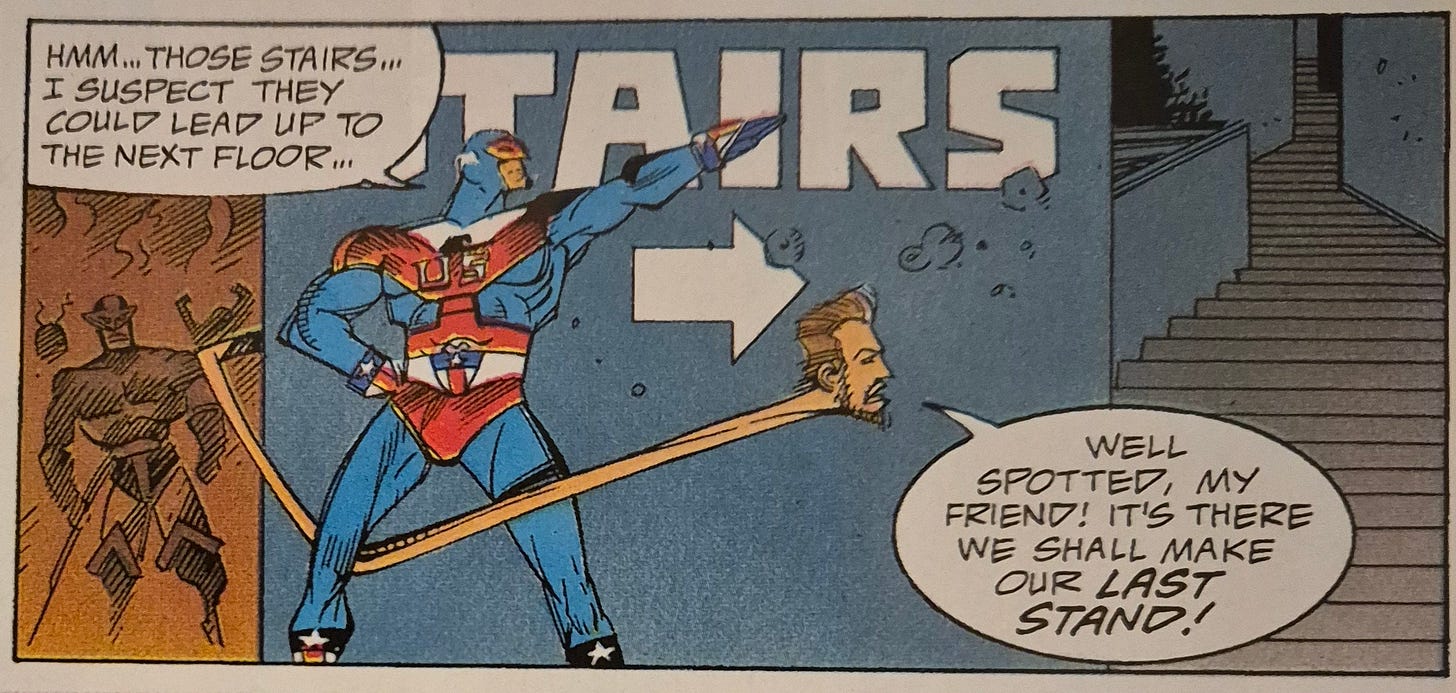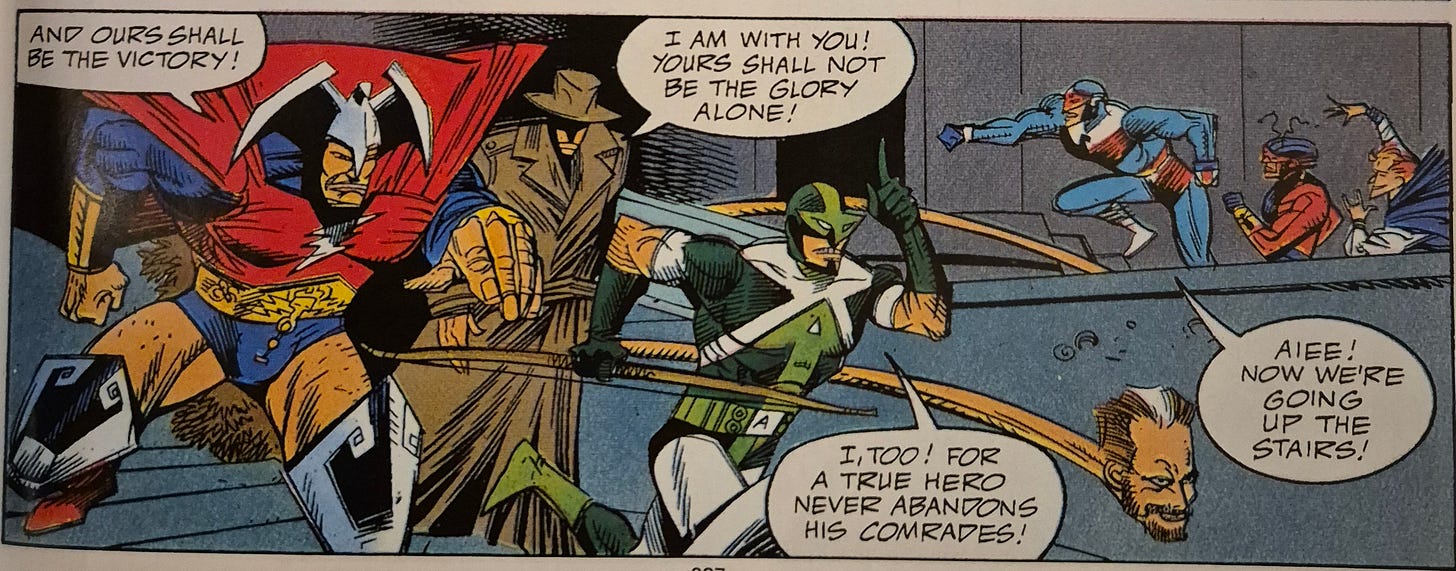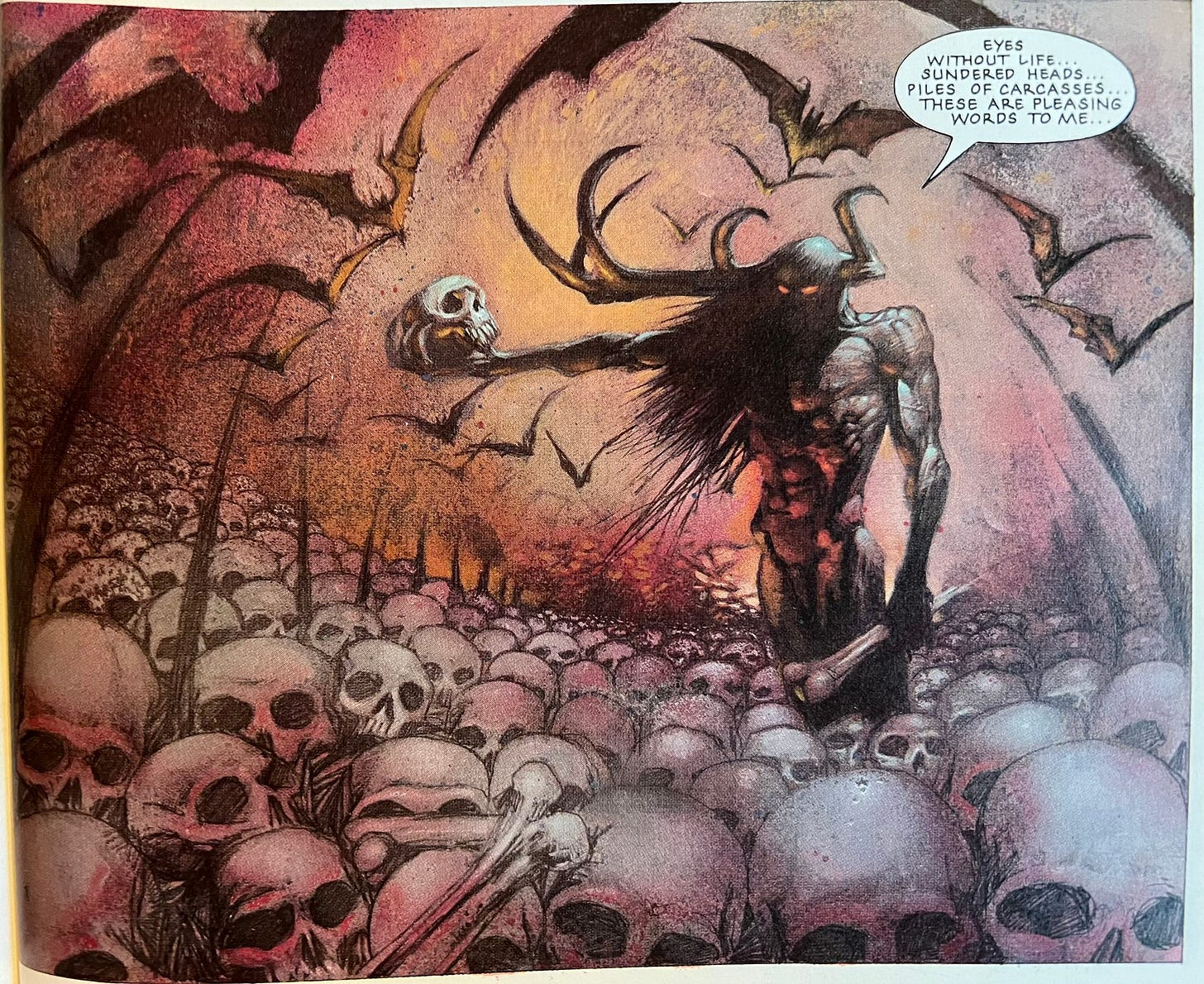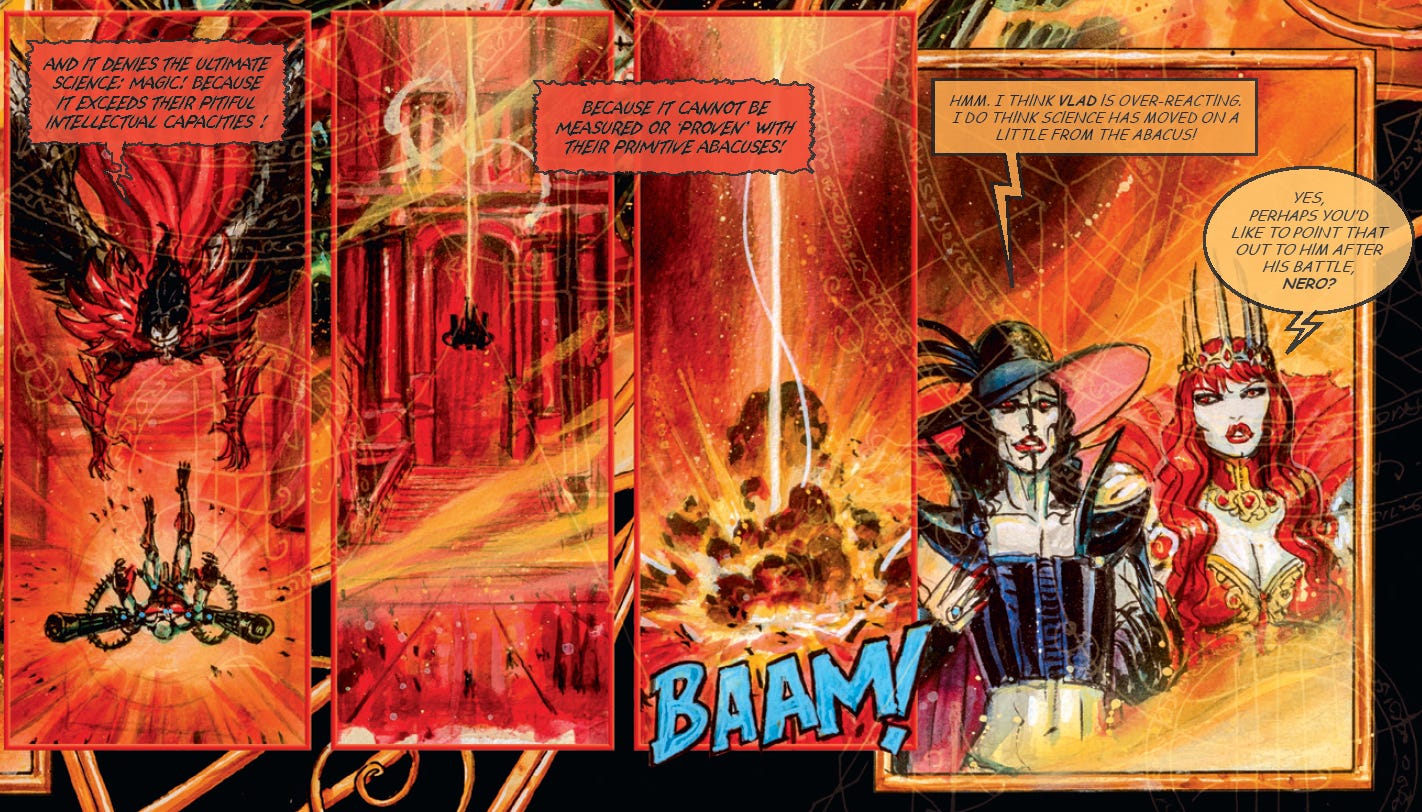I’ve just watched Series Five of the excellent show The Americans and I’m onto the last series. DO NOT tell me how Series Six ends, I haven’t a clue!
But towards the end of Series Five, something strange happened. The plots were stretched, the dialogue became flat, and there were endless reprises.
Lisa and I were seriously thinking of giving up on the series.
Now I know how loyal 2000AD readers must have felt when their comic mysteriously changed and lost its direction in the 1990s.
Thankfully, Series Five recovered and the Series Six episodes we’re currently watching are fantastic!
But it’s worth looking at what went wrong.
There were dialogue reprises on what we already know, which felt suspiciously like padding. Comics used to do that once upon a time to give superheroes something to say when they were bashing each other.
Sometimes the dialogue was also the bleeding obvious.
Of course it could never be as bad as in comics, which I took the piss out of in Marshal Law. The scene I’m particularly fond of in ‘Takes Manhattan’ is ‘Old Glory’ a Captain America look-alike running up the stairs with his fellow super heroes, and saying excitedly, ‘Aiee! Now we’re going up the stairs!’
The Americans in Season 5 were not far away from that.
There were also plot directions that ultimately went nowhere and also felt like padding.
But the worst bit for me was that Paige and Henry (the children of the soviet spies Elizabeth and Philip Jennings) did not sound like teenagers. They felt like products of the Writers Room: their dialogue was purely plot-driven, with no personality.
It’s how I imagine AI writes dialogue.
For real teenagers check out Nemesis – Deathbringer, by myself and John Hicklenton (I talk about it here), where I collected real teenager dialogue and used it to great effect.
So I thought it might be valuable as a kind of ‘Pageturners extra’ to give a run-down on how to write dialogue. I learnt most of what follows the hard way, the VERY hard way. No one told me any of this, so I hope it will be a useful shortcut for a new generation of writers
DIALOGUE – A PAGETURNER EXTRA
If you’re a natural dialogue writer, then you don’t need my help and I may even need yours. But most of us are not.
If you’re not a natural dialogue writer, then you need to carry a small notepad and eavesdrop on people as I do. Listen out for their unique ways of saying things.
I’ve also used a recorder on occasion.
Looking at transcripts of interviews is another resource.
Then adapt the dialogue to fit your characters and plot.
Books are valuable for collecting little gems of dialogue. Such as ‘Boudoir Bolsheviki’. This was a 1917 sneering, right wing insult to describe radicals like Sylvia Pankhurst or Edmund Morel.
It’s the equivalent today of calling North London Labour party members ‘Champagne Socialists’. The phrase came from Captain Pollard – a real life James Bond – who is a superb dialogue source as there are plenty of his books available.
I’ve no idea what Pollard would call Starmer and co., but it would probably be harsher and devastatingly accurate.
With such gems as your guide, you can get into character and write more in the same vein.
But characters like Pollard and their dialogue are rarely revealed in print. That’s why I talk about him so often – he was a real life Flashman and the only reason he hasn’t already been made into a movie or TV series is because he makes the Establishment look bad. VERY bad.This is why he currently features in FOUR of my stories!
He’s the man who started the Spanish Civil War, wrote sick lies about the Germans in World War One, and played a key role with the Black and Tans during Ireland’s war of independence. How he escaped the Republican assassins on ‘Bloody Sunday I don’t know, but there’s definitely a story in it.
Books on similar secret agents like Sidney Reilly – another James Bond – have the plot details but, unlike Pollard, don’t reveal his true character through his dialogue.
When that happens, you have to approach dialogue in a different way.
Then you can graft onto your character your own persona or
someone you know or remember well.
Thus a friend of mine would tell me endless gems.
Such as in response to a Headmaster who tried to calm her down about the school’s treatment of her son. He offered her a cup of coffee. She replied: ‘Don’t bother. It will be up the walls the mood I’m in.’
I would follow this friend around with a notebook. As I’ve related in Pageturners, I used her as a key female character in Marshal Law after she was seen as ‘too working class’ and therefore was rejected for an abortive Doctor Who TV project.
She didn’t know her place.
Unique speech patterns are worth looking out for. Preferably NOT obvious patterns… like stuttering.
Echo chamber is okay – repeating the last thing someone said.
But definitely NOT imitating Golem’s brilliant speech pattern in Lord of the Rings, which has been copied far too often.
So I used authentic legendary sources for my fantasy characters. Like Slough Feg, the magician in Sláine. He has a unique speech pattern: ‘Eyes without life. Sundered heads. These are pleasing words to me.’ And ‘Am I not a candidate for fame?’
No one has that speech pattern except Slough Feg, which is why I’m so fond of him.
To find those gems I had to wade through the ancient Book of Taliesin and other original texts at a time, when they were not free on the internet. So it was a very costly process, but worth it.
Turning emails into dialogue is worthwhile if you’re in correspondence with someone lively.
But for ranting, bias, extreme and poisonous views then here’s the ultimate:
Daily Mail readers’ comments!
It’s easy to adapt the meanest DM reader into a Warlock, Pirate or mad General. They’re absolutely full of black hatred!
Donald Trump and other US Presidents are useful for similar reasons. Trump has a unique speech pattern. He talks about ‘bad hombres’. He mixes ‘anger, fear and insults to stir supporters’. Of course he may be too recognisable. I haven’t really checked him out.
Back in the day, many comic writers used Idi Amin. Today, that would be seen as racist. There was a memorable story in 1984 (Warren) by Bill Dubay and Maroto where a beautiful, semi-naked woman has been possessed by and talks like Idi Amin. I doubt it could be reprinted today.
Dialogue that may be fine for the UK is not acceptable in the USA. Hence the two different versions of The Office. The American version is much tamer. I heard Fawlty Towers was once optioned for the USA, but they deleted Basil! I had a similar experience where my dialogue for a villain, based on a real life female Basil, was thought to be ‘too obnoxious’. What a shame. My character said the most evil and unspeakable things!
Know your characters. Give them a back story. They have to be as real as your mum. At least partly based on people you know. Otherwise their dialogue is likely to be flat.
Flat characters are likely in war scenarios – boring ‘stiff upper lip’ officers, Jack Hawkins or Richard Todd types, straight out of old Ealing movies. Combined with ‘off the peg’ combat jargon. But real soldiers’ dialogue escaped censorship in soldiers songs. See for example the lyrics of ‘Oh, what a Lovely War’. Or modern soldiers marching songs.
As I’ve exampled, there’s still an attempt – even today – by the Establishment to show ordinary people as inferior, stereotyped or respecting authority. It didn’t end with Upstairs, Downstairs. The servants in Downton Abbey are just as subservient. They know their place. So nothing has changed in my lifetime!
The upper class shitbags they wait on are generally wise, kindly, cultured, superior and well-meaning. Which is very far from the truth. My limited experience of them is that they were a sinister, hateful bunch of bastards. But the Establishment have to promote this b.s. because otherwise the spotlight could be turned on the royal family and they would be seen as the gruesome lot they truly are.
One such upper class shitbag is ex-Bishop of Canterbury Justin Welby, who disgraces himself every day with his cruel and insensitive remarks. Worth having a look at a transcript of his resignation speech – if you have the stomach for it.
So where to find authentic working-class dialogue? Here’s one source. A transcript of the trial of the owner of a Derby second-hand clothes shop, fierce matriarch and suffragette Alice Wheeldon at the Old Bailey in 1917. Her dialogue jumps off the page. What a true hero that woman was. Look at a photo of her. Her square jaw tells us she’s not going to take shit from anyone. But the bastards still broke her.

She refused to swear on oath on the bible and from that moment on, she was screwed. I still shed tears when I think about her courage and her fate. Women like Alice are the role models children need today.
Moving onto the technicalities. Use one sentence of dialogue to express what’s at stake. Two sentences is a duplication, a repeat, and slows a scene down. There are exceptions.
Follow the plus and minus rule in a scene. As brilliantly described in Robert McKee’s Story. There has to be a change in the mood, or character’s situation, to avoid the scene being exposition. There were several such exposition scenes in Season Five of The Americans.
Thus, here’s a scene from my work in progress novel between protagonist Sean Stone and Siegfried Sassoon:
The scene starts with a positive as protagonist Sean Stone thinks he and Sassoon are both anti-war. But gay Sassoon is only interested in Stone as a date. Not his politics. So Stone turns down his offer of going to a London show and then onto supper somewhere.
It ends with a negative. A disappointed Sassoon says: You don’t know what you’re missing, Sean. Stone replies: I think I do.
Dialogue here is coded. It’s not ‘on the nose’. Subtext: What they’re talking about is not what they’re talking about.
It’s what’s not said.
In Fleabag, the main character says, ‘I’m fine. I’m good. Nothing’s wrong.’ In fact, everything is wrong.
Also, as in Sassoon scene, the delivery of dialogue is relevant. So Sassoon is nervous, he gabbles his own brilliant poetry and avoids eye contact with Stone as he is speaking.
It makes his dialogue interesting and unique.
This was based on a priest I remembered who gabbled his way through Mass in a very disrespectful way. I discovered Sassoon also gabbled his own poetry. They had different motives, but it meant I could write with conviction.
Use role models – people you know well – for your characters.
Ask your role model directly, ‘What would you say in this situation’. It was a technique I used in Third World War. The British film director Mike Leigh used a similar approach. The answers are usually surprising and rarely what you expect!
Find a subject you feel passionate about and use a character as a vehicle to express your views in dialogue.
Thus in The Fall of Dracula, (from my series Requiem Vampire Knight), the Count rants about how he hates aspects of science as he destroys a Frankenstein’s monster. I based my Dracula on Stalin. But his rants come from shards of my personality. So characters’ dialogue is often formed from a fusion of several sources.
It was very cathartic (okay, a bit polemic!) to rant about the shortcomings of science and get paid for it!
Psychological types are valuable for inspiring dialogue.
The most well known are narcissists and there’s masses of information about how to recognise them online. We all of us know narcissists, or those leaning that way, so you’ve got some instant characters there. Their conversation will have unique elements. They are only interested in themselves, so in their dialogue they will never ask ‘How are you?’ Except maybe as a grudging afterthought.
Hope this is useful and if there’s any tips you found especially helpful, do say and I can maybe expand on them another time. So we can avoid the numerous pitfalls of comic dialogue, best exemplified by the Old Glory lines, ‘Aiee! Now we’re going up the stairs!’
Pageturners is available to buy as an e-book from my Gumroad store here.
You can also buy it on Kindle or in paperback here.










The attention that you pay to the dialogue really shines through.
I recently had a thought as I attempted to watch Lucifer after enjoying the comics. I knew it wouldn't be the same but it made me realise that I want my comic book cliches in comics, not TV. And American TV cliches are the worst.